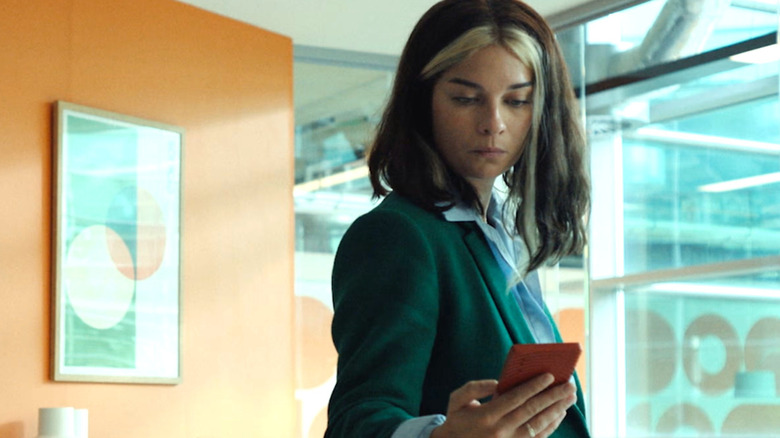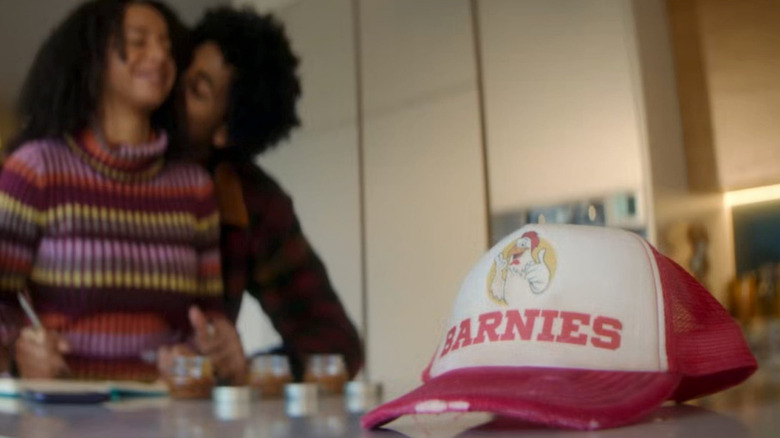How Black Mirror Creator Charlie Brooker Really Feels About Netflix's Feedback
In "Black Mirror" fan circles, the series is often discussed as if there are two different shows: the British Channel 4 "Black Mirror" and the American Netflix "Black Mirror." Some fans insist that something crucial was lost the moment "Black Mirror" was bought by Netflix, that the dastardly American streaming service ruined all the things that made the show so special.
While Netflix has certainly done a lot of terrible things over the years (like removing "Bandersnatch"), it is not the reason for all those changes in the show's tone and approach. The longer runtimes, the happier endings, the celebrity castings — these are only Netflix's fault in the sense that they gave showrunner Charlie Brooker the budget and creative freedom to make them happen.
"Netflix, it pains me to say, has not really ever given me a dumb note," Brooker explained in an April 2025 interview, "Which is almost annoying because you'd like to feel like you're a swashbuckler who would ignore it. But I try not to read notes on a phone when that email comes through because if you scroll, it goes on for 100 years. And then if you look at it later on a desktop computer, it's like, 'Oh, that's two sentences.'"
Brooker has consistently said over the years that Netflix is pretty hands-off, presumably because the higher-ups understand how much of a hit "Black Mirror" is and don't want to get in the way. It's a nice contrast to Channel 4, which Brooker said had gotten very controlling when they'd first tried to make season 3 under their helm. Even Netflix's crime of removing "Bandersnatch" is hard to get too angry about, because an interactive episode like that one would surely never have been made in the first place if this was still a Channel 4 show. (That said: please bring it back, Netflix!)
Netflix has allowed 'Black Mirror' to get real weird with it
Probably the coolest trick Netflix has let Brooker pull was with the season 7 episode "Bête Noire," which quietly released two separate versions of the episode and didn't warn viewers ahead of time. In both versions, the characters are arguing over whether a restaurant chain is called Barnies or Bernies. In one version, the main character Maria (Siena Kelly) is confused and distraught to realize that the restaurant is called Bernies. In another version, she realizes the restaurant's called Barnies. The trickery doesn't affect how the episode itself plays out, but it did affect how fans talked about the episode afterward. They'd get into their own argument about whether it was called Bernies or Barnies, having their own moment of feeling gaslit when they returned to the episode for proof.
This sort of trick is rare on TV, and likely couldn't have happened on a broadcast channel like Channel 4. The closest comparison I can think of is "The Simpsons," where the writers considered releasing multiple versions of "Who Shot Mr. Burns?" with a different killer revealed in different parts of the country. But even that wouldn't have been the same. Most people, especially in the '90s, would've been talking to people who lived near them about the episode afterward, so there wouldn't have been as much confusion over what really happened.
Perhaps the clearest sign of how hands-off Netflix is with "Black Mirror" came in season 6, when the show released two episodes in a row where Netflix was the villain. "Joan is Awful" revolved around the main character realizing that Streamberry, an obvious stand-in for Netflix, has sleazily created an entire TV show based around her personal life. "Loch Henry," meanwhile, ended with Streamberry making an exploitative true crime drama about the events of the rest of the story. Netflix/Streamberry is portrayed absurdly negatively in both episodes, but Netflix sure didn't seem to care.

